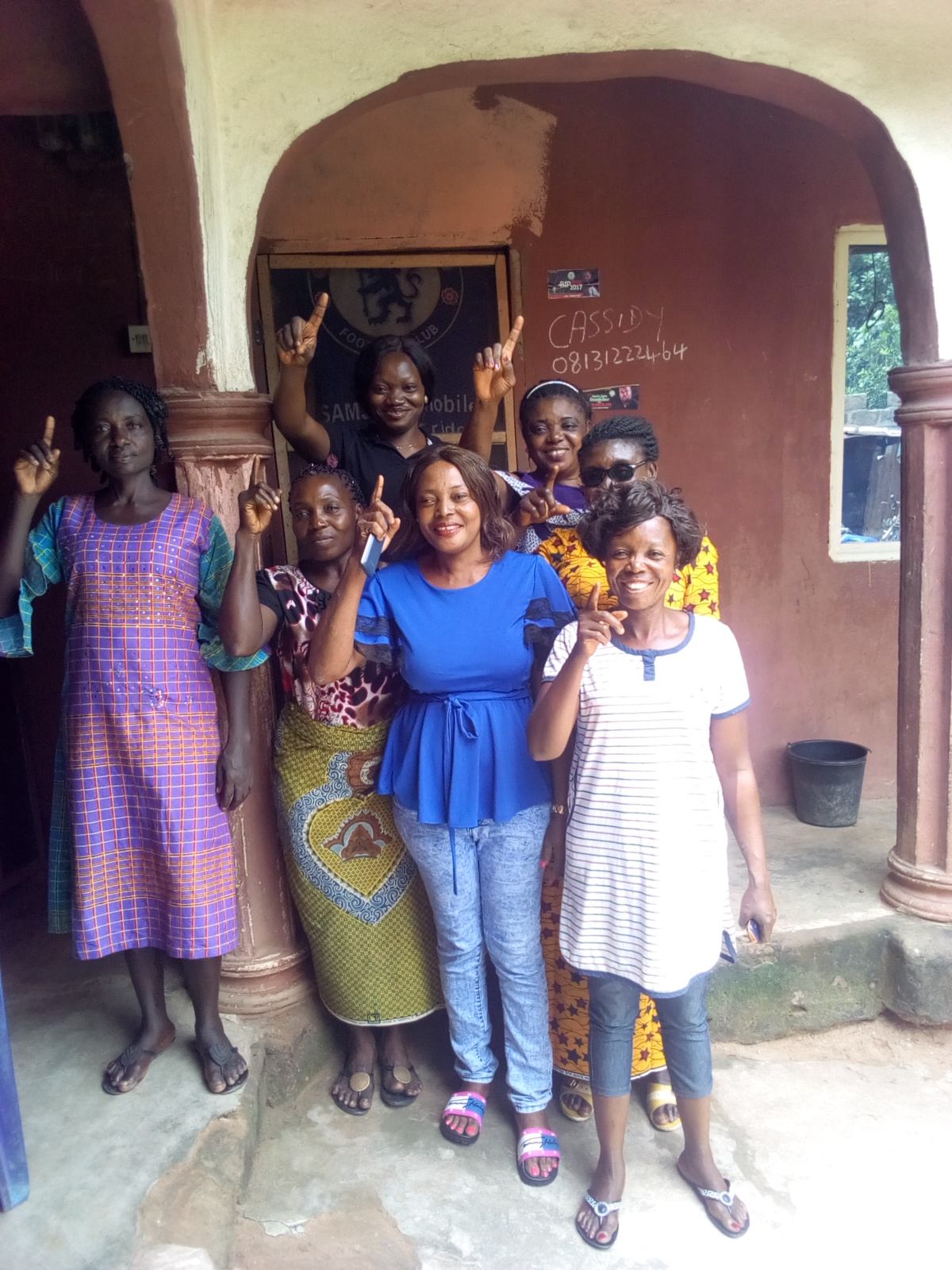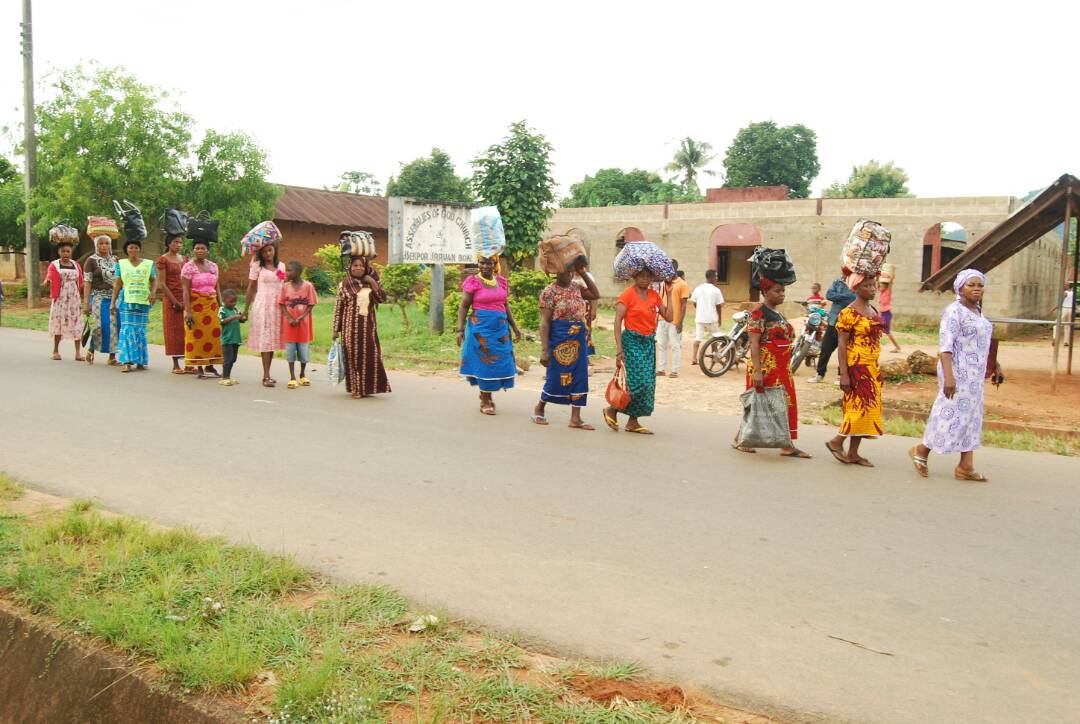NIGERIANS LIVE WITH INSECURITY BECAUSE NIGERIAN WOMEN HAVE NO HOMES, NO COUNTRY.
Jun 4, 2019
Story

Florence Kekong
Nigeria
Aug 7
Joined Jul 25, 2012


NIGERIANS LIVE WITH INSECURITY BECAUSE NIGERIAN WOMEN HAVE NO HOMES, NO COUNTRY.
When I saw this question, " What does security mean for you, your home and for your Country?", I got a mix-up in my head. This is because, so many flashes of ugly experiences clouded my memory. I asked myself the question," Does a woman have any home anywhere in Nigeria?" I remember when growing up the things that men in my community said. "A woman has no country. A woman has no place". Their reasoning is that women get married and taken away to their husbands. They change their names and bear children for the families where the have been married into. So educating a girl child to them was like throwing all your wealth into a river. Sadly, that is the state women still are, in Nigeria. Security issue in Nigeria is a serious concern, and more of a human rights issue, when it comes to considering the insecurity women and girls still face in the country. The girl child grows up to meet this stereotype. Her parents' home isn't fashioned to be hers because she would grow up to get married into another man's home which would then become hers. This becomes reality when she eventually gets married. But more reality sets up when the husband and even his family on the other hand begin to show to her that the husband is the Head of the Home, even if she had suffered with him (sometimes she could out in more efforts than the man) to build the home from the scratch. Her delima here begins when the man begins to treat her like his "Property" instead of wife, because he had paid a heavy sum if money as Dowry, on her head. The Dowry gives him all the rights to treat her as his property, decudes what he wants to do with her, how he wants her to be, when he wants sex, the number of children he wants, and what kind of life he wants to give his children. The woman has no say, to the extent that he can beat her mercilessly, get her injured or even dead and nothing would happen. After all, she is his wife. Cases still abound in Nigeria, where a man beats his wife to his satisfaction and forces her to have sex with her even when she is still in tears and pains. Some women's situation is worst when their husbands are alcohol drunkards. The torture these women go through is better imagined.
Situations get worst for women in Nigeria facing numerous problems in their matrimonial homes when they cannot return to their fathers' homes. Here in Nigeria we all still easily call our homes, "Father's house", instead of "Patents' home". That is how the situation still is, today. When she decides to go back to her parents, the problem of sibling rivalry sets in as well. They had all "sent" her off and as such, she isn't expected to return to sharing or "struggling" anything with them anymore. Rather, her family expects her husband to always give to them for marrying their daughter.
Now as you read this piece, you will see clearly that women are not secured in any home in Nigeria, not to talk about the workplace, where you are cheated and sidelined from assignments that could add a raise to your economic status, simply because they call you married woman and even when the office doesn't put a blockage, the woman's husband ,himself, might. He could decide the kinds of jobs the wife should be engaged in, just because, she is a wife.
I I know where it hurts because I have been and I am still a victim of the experiences sighted. I am wearing the shoes so I know where it pinches. This simple notes I have brought out shows to us, the picture of insecurity in Nigeria. There are many more ways but I narrowed it to this because the situation of women and security is bad in this country. How can women feel secure in a country where laws, customs and traditions have been designed by the men and being implemented by the men themselves. Who will speak for the women? Did we not see it happen here that even the President of Nigeria, Muhammad Buhari told his wife, Ashia that she belongs to the "Other Room", when she attempted adding her voice to wrong decisions being made in his administration? That is the state of insecurity in Nigeria. Almost all the women have been victims of some form of violence- rape, domestic violence, sexual violence and other forms of violence perpetrated based on gender. The home, whether your Patents' or matrimonial home, is supposed to be where you find love, happiness, safety, shelter and security but for some if us, this is still a mirage, from the different angels that one may want o look at insecurity in Nigeria. I was bothered and sent out of my husband's "House" but got the worst experience from my own mother and siblings as I returned back to my parents. A bad condition I still live with today. I know many other women who are still facing the same predicament and we are on a country where the Police still treat domestic violence laced by wife battering as "Husband and Wide Matter", to be resolved at home. From infancy, through childhood, adolescence to adulthood and of course, until we get so old and tired that we can do but nothing else than to resign our fate to a life of hopelessness, women suffer insecurity in all its ramifications.
So does security mean for my count? I wonder, too. To me, security, when relating it to insecurity of women and girls in Nigeria, isn't given a priority attention. The security sector hasn't created strong measures that ensure a secure environment for women and girls. This is so because the people athe helm of affairs are still predominantly, men who may not have realised that creating an enabling and safe environment for women is the beginning of a secured nation. Insecurity threatens the whole nation because there is no security and peace for the women who are the home build, and even the builders of the nation. Women's security is dependent on the security in the home, as well as protection from violence and sexual harassment everywhere. This requires actions, as the World Pulse is leading in this campaign for security of women everywhere. These actions must get all of us involved. The various State entities-Police, Justice and most importantly, too, the health systems. We must truly work together with stakeholders from different the different sectors, including the community people, to put into place, concrete actions to address women's security needs.
On my part, I have set up he Grassroots Women Journalists in Nigeria (GWJiN) as a network that connects the rural people with global happenings. We mobilize women leaders from the communities and train them to report events in the communities with a gender lens. This is my own way if getting ruralwomen involved in reporting all issues around them. This is yielding positive results more and more women now call me from the villages to inform me about whatbis happening. For instance, when some women from Esekwe Irruan in Boki, Cross River State were sent out of the community because they refuse to partake in the traditional festival that celebrated the advent of the Cocoa yams, they called me to inform me.
I asked them to take photographs but they do not have smart phones that can do that. We still found a way out by engaging a youth that is serving his National service in the community to do it for us. I reported the case widely and the courts intervened, even though the community people are still standing in the grounds that these women paid some fines. Otherwise, even as they returned to the village as the courts ordered, no member if the community is permitted to say greetings to them or answer their greetings. The women, most of them widows, are no longer allowed int their farms. Neither are they allowed to fetch water or wash clothes in the community's streams. So here, we see that even when Justice is brought in to take its course, the community people, headed by the men, have thwarted the process.
There is a case I am still investigating. One of the women we have trained called from Oku, another community in Boki to report the case of a pregnant woman being gang raped by cultists who claim that they are seeking for supernatural powers. The case is still with the police but the point I am trying to make here is that, through my Grassroots Women Journalists in Nigeria (GWJiN) Initiative, more and more women are aware of the need to report he ugly circumstances surrounding their very existence.
Niw, amidst all these sad conditions, I take solace in the fact that the World Pulse is opening our understanding to the fact that all is not lost and something can still be done to change this ugly plight, but only if we report the events, speak out to be heard and participate in proffering solutions to the insecurity of women around the world.
Consider also, the fact that the 2030 Agenda for sustainable development now focuses on what measures can be used to integrate local realities at the fire-front of the Sustainable Development Goals (SDGs). The Goals are ambitious that sustainable development can be achieved if we transform it's global aspirations by integrating local realities. This requires an unprecedented mobilization of resources, partnerships and knowledge at the global, national and sub-national levels. The Gold are inclusive and therefore, it is critical that even as we think locally in our aim to ensure that vulnerable groups, of whom women and girls are among, are not left behind, we should now push for the security of all women at all levels, as well. The SDGs are now three years in the implementation stage but the challenge of insecurity of women still persist everywhere.
It is time now to take stock as the SSG implementation is still in the early stage,o f how the importance of the 2030 Agenda can be accelerated by making better use of means to achieving security for women everywhere, to influence actions and progress.
When we continue to voice out and take actions as we are already doing through the World Pulse, we can be sure that the insensitive, inefficient, corrupt practices will no longer deter against the various forms of crimes we are experiencing now.
Many violent acts continue because our laws are not truly put into place and the needs of women are not taken into account. If the security sector begins to take a new turn and adequately begin to respond to and address Hunan rights violations and violence, especially, against women and girls, would our Country, Nigeria, be a secure place for all and the nation would progress impressively in all ways.
Together, we will raise our voices and take actions to create a more peaceful world.



